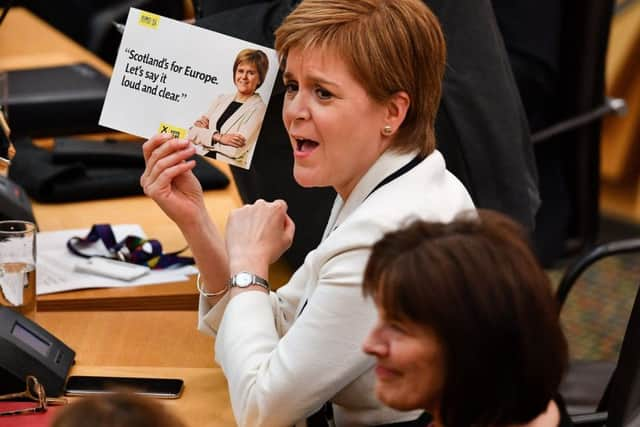Referendum bill has ‘energised’ grassroots Scottish independence activists
Last month Mike Russell, the SNP’s constitutional affairs spokesman, told MSPs that a potential no deal Brexit would mean “an even greater urgency to give Scotland a choice of a different future”.
Scottish ministers hope the bill laying the framework for future referendums would be passed by MSPs by the end of the year.
Advertisement
Hide AdAdvertisement
Hide AdWhile that alone won’t guarantee any IndyRef2 can take place, the legislation has been hailed as “an important step in the right direction” by Voices for Scotland (VFS), a non-party civic organisation established earlier this year with the aim of engaging with voters sceptical about independence.


Chris Hegarty, the group’s coordinator, told Scotland on Sunday: “We recognise there’s something of a stand-off between a UK Government that doesn’t seem to want another referendum and a Scottish Government that does.
“But the United Kingdom, as its name suggests, is a union of countries; it isn’t and can’t be - in any sustainable sense - a hostage situation. Ultimately Scotland’s Parliament is surely the natural place in which the debate about our country’s future can be led.”
Asked if the referendum bill had motivated its membership, he added: “Voices for Scotland is the campaigning arm of the Scottish Independence Convention, and the convention’s membership has always been hugely motivated.
“But it’s fair to say that people feel that UK politics is going in a direction that makes it inevitable that Scotland will consider a more positive alternative path in the near future.
“So, yes, people are gearing up for another campaign, ourselves included. Whether that campaign comes sooner or later, we don’t know, but we need to be ready for it.”
Margaret Young, national coordinator of Women For Independence (WFI), said the cross-party group had seen an increase in membership enquiries in recent weeks and was planning a manifesto launch later in the year.
Originally set-up in 2012 to encourage more women to engage with the constitutional debate ahead of the referendum two years, WFI was viewed as one of the campaigning success stories of the 2014 referendum.
Advertisement
Hide AdAdvertisement
Hide Ad“We have never gone away,” Young said. “Our membership is quite active. “Clearly, with more talk around a referendum we have seen more interest and uptake in membership.
“The details of the bill are there but it is still at a very early stage. We want to speak to people who are genuinely unsure, or maybe don’t support independence at all.
“I think if you call something a constitutional debate it sounds very dry and technical. But if you talk about issues people are worried about, things they want tio see change, they will engage.”
Pro-Union parties have insisted there is little appetite for another referendum campaign given the continuing Brexit impasse.
But Hegarty said independence’s “positive” message could offer an an antidote to any voter fatigue.
He continued: “There are clearly mixed views across Scotland on whether, and if so when, we should have another independence referendum.
“Given how dysfunctional and exhausting UK politics has been in recent times, it’s no surprise that some people aren’t as enthusiastic about another big political event as others.
“But the gains to be made from independence have never been clearer.
Advertisement
Hide AdAdvertisement
Hide Ad“The case for independence is a wholly positive one, based on taking responsibility for our own choices, on making the most of the enormous natural and human resources that Scotland has, and on the democratic and social benefits of being a normal, self-governing country.”